Analysis: Harvester Case and Minimum Wage Standards in Australia
VerifiedAdded on 2024/05/31
|7
|749
|300
Case Study
AI Summary
This case study examines the historical significance of the Harvester case in shaping Australian employment law, particularly concerning the establishment of minimum wage standards. The Harvester case, decided in 1907, set a precedent by determining a fair living wage for unskilled workers. Subsequent amendments and the establishment of bodies like the Australian Fair Pay Commission and later the Fair Work Commission have built upon this foundation. The Fair Work Commission continues to adjust minimum wages based on societal changes and living standards, ensuring both men and women receive equitable compensation. The study concludes that the principles established in the Harvester case remain relevant in contemporary Australian employment law, guiding the determination of minimum wages and fair labor practices.

Employment Law
1
1
Paraphrase This Document
Need a fresh take? Get an instant paraphrase of this document with our AI Paraphraser
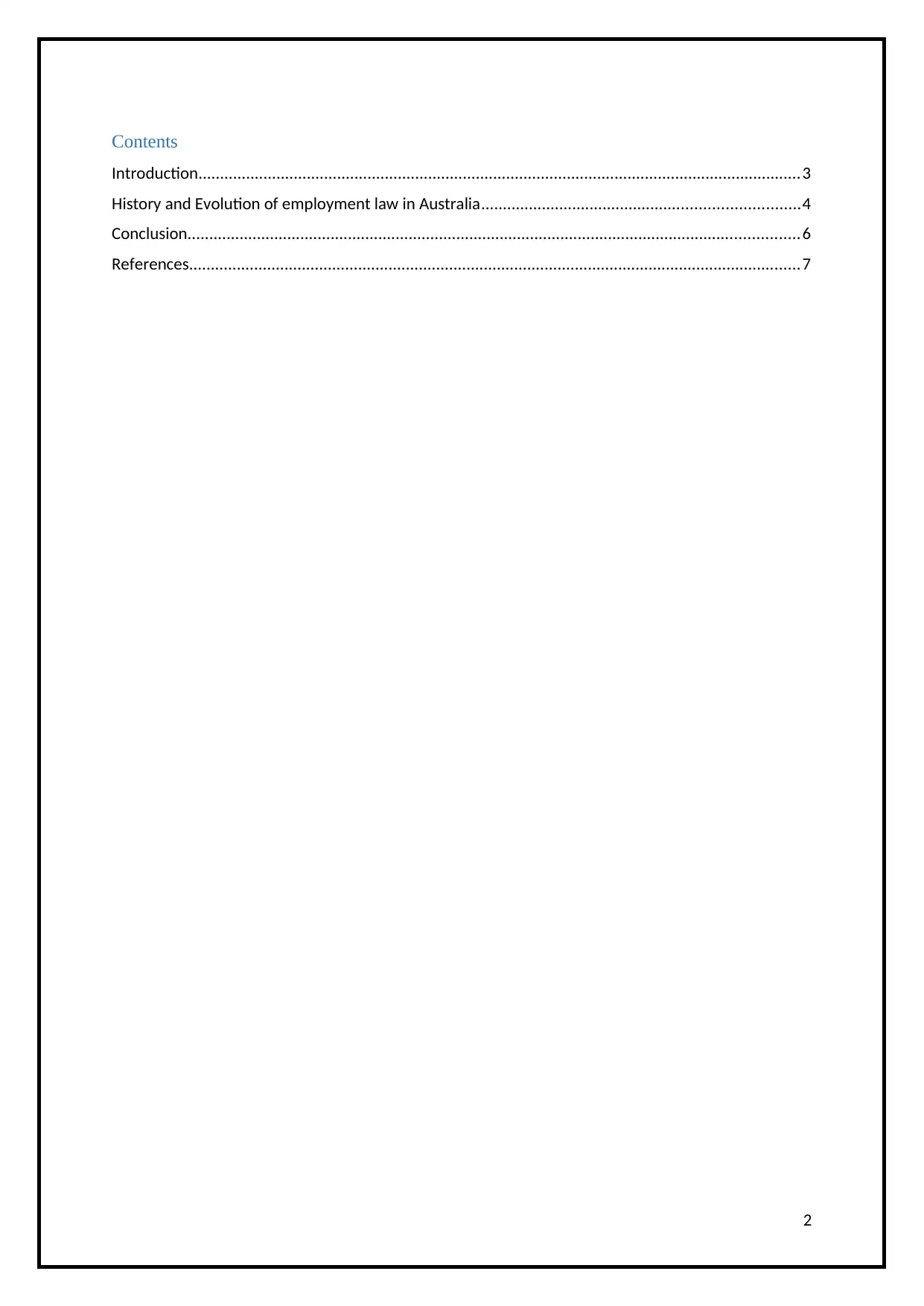
Contents
Introduction...........................................................................................................................................3
History and Evolution of employment law in Australia.........................................................................4
Conclusion.............................................................................................................................................6
References.............................................................................................................................................7
2
Introduction...........................................................................................................................................3
History and Evolution of employment law in Australia.........................................................................4
Conclusion.............................................................................................................................................6
References.............................................................................................................................................7
2
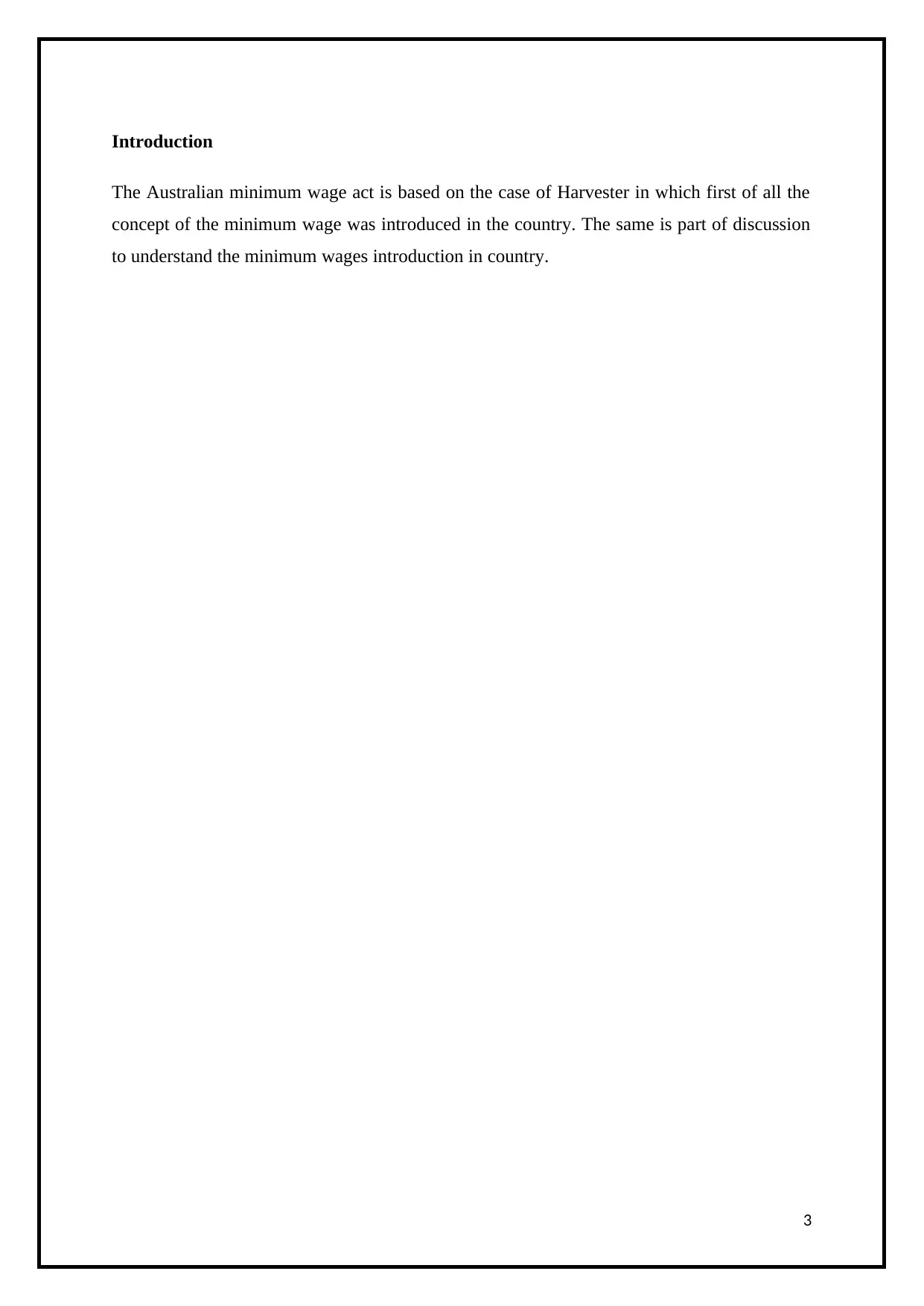
Introduction
The Australian minimum wage act is based on the case of Harvester in which first of all the
concept of the minimum wage was introduced in the country. The same is part of discussion
to understand the minimum wages introduction in country.
3
The Australian minimum wage act is based on the case of Harvester in which first of all the
concept of the minimum wage was introduced in the country. The same is part of discussion
to understand the minimum wages introduction in country.
3
⊘ This is a preview!⊘
Do you want full access?
Subscribe today to unlock all pages.

Trusted by 1+ million students worldwide
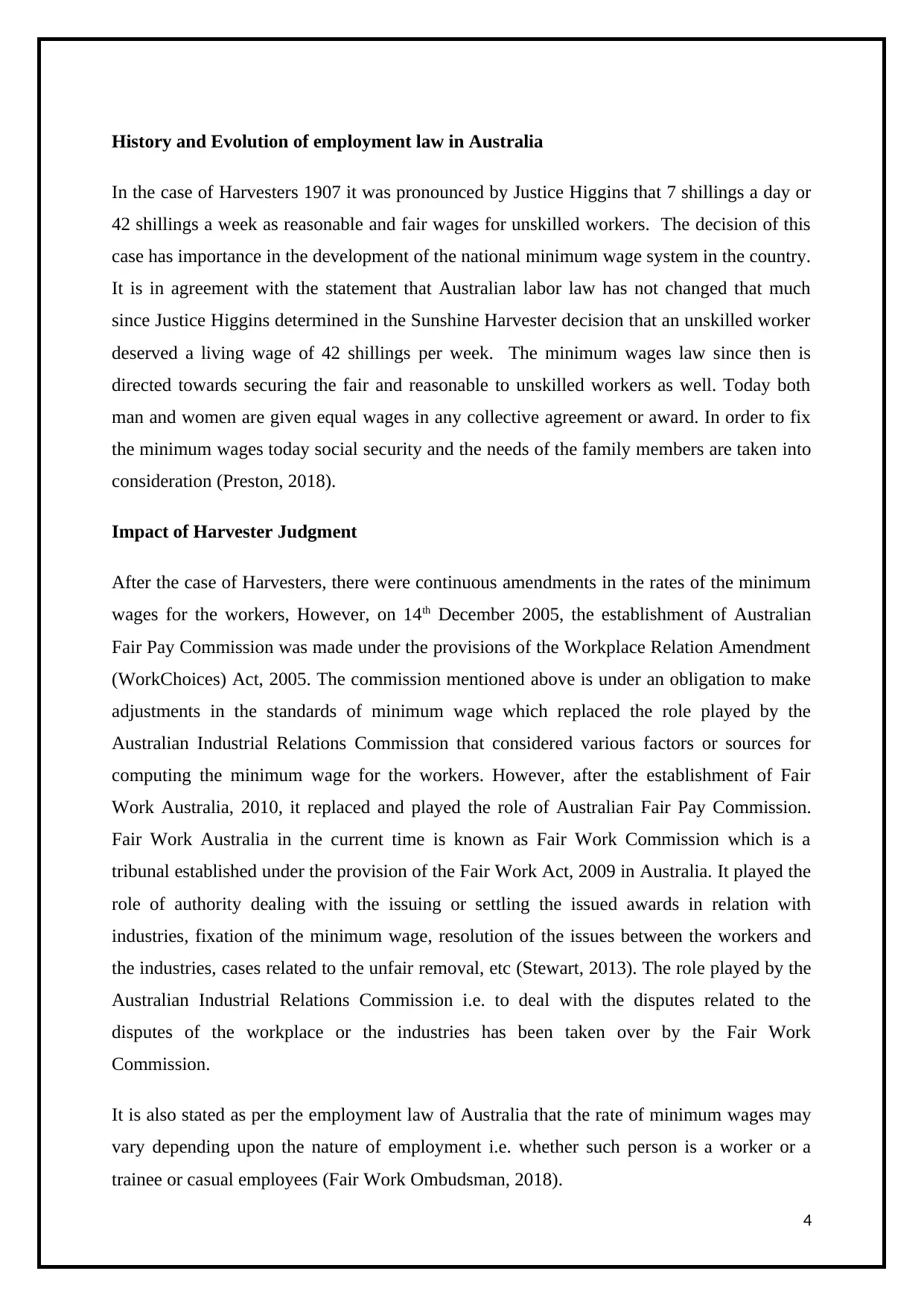
History and Evolution of employment law in Australia
In the case of Harvesters 1907 it was pronounced by Justice Higgins that 7 shillings a day or
42 shillings a week as reasonable and fair wages for unskilled workers. The decision of this
case has importance in the development of the national minimum wage system in the country.
It is in agreement with the statement that Australian labor law has not changed that much
since Justice Higgins determined in the Sunshine Harvester decision that an unskilled worker
deserved a living wage of 42 shillings per week. The minimum wages law since then is
directed towards securing the fair and reasonable to unskilled workers as well. Today both
man and women are given equal wages in any collective agreement or award. In order to fix
the minimum wages today social security and the needs of the family members are taken into
consideration (Preston, 2018).
Impact of Harvester Judgment
After the case of Harvesters, there were continuous amendments in the rates of the minimum
wages for the workers, However, on 14th December 2005, the establishment of Australian
Fair Pay Commission was made under the provisions of the Workplace Relation Amendment
(WorkChoices) Act, 2005. The commission mentioned above is under an obligation to make
adjustments in the standards of minimum wage which replaced the role played by the
Australian Industrial Relations Commission that considered various factors or sources for
computing the minimum wage for the workers. However, after the establishment of Fair
Work Australia, 2010, it replaced and played the role of Australian Fair Pay Commission.
Fair Work Australia in the current time is known as Fair Work Commission which is a
tribunal established under the provision of the Fair Work Act, 2009 in Australia. It played the
role of authority dealing with the issuing or settling the issued awards in relation with
industries, fixation of the minimum wage, resolution of the issues between the workers and
the industries, cases related to the unfair removal, etc (Stewart, 2013). The role played by the
Australian Industrial Relations Commission i.e. to deal with the disputes related to the
disputes of the workplace or the industries has been taken over by the Fair Work
Commission.
It is also stated as per the employment law of Australia that the rate of minimum wages may
vary depending upon the nature of employment i.e. whether such person is a worker or a
trainee or casual employees (Fair Work Ombudsman, 2018).
4
In the case of Harvesters 1907 it was pronounced by Justice Higgins that 7 shillings a day or
42 shillings a week as reasonable and fair wages for unskilled workers. The decision of this
case has importance in the development of the national minimum wage system in the country.
It is in agreement with the statement that Australian labor law has not changed that much
since Justice Higgins determined in the Sunshine Harvester decision that an unskilled worker
deserved a living wage of 42 shillings per week. The minimum wages law since then is
directed towards securing the fair and reasonable to unskilled workers as well. Today both
man and women are given equal wages in any collective agreement or award. In order to fix
the minimum wages today social security and the needs of the family members are taken into
consideration (Preston, 2018).
Impact of Harvester Judgment
After the case of Harvesters, there were continuous amendments in the rates of the minimum
wages for the workers, However, on 14th December 2005, the establishment of Australian
Fair Pay Commission was made under the provisions of the Workplace Relation Amendment
(WorkChoices) Act, 2005. The commission mentioned above is under an obligation to make
adjustments in the standards of minimum wage which replaced the role played by the
Australian Industrial Relations Commission that considered various factors or sources for
computing the minimum wage for the workers. However, after the establishment of Fair
Work Australia, 2010, it replaced and played the role of Australian Fair Pay Commission.
Fair Work Australia in the current time is known as Fair Work Commission which is a
tribunal established under the provision of the Fair Work Act, 2009 in Australia. It played the
role of authority dealing with the issuing or settling the issued awards in relation with
industries, fixation of the minimum wage, resolution of the issues between the workers and
the industries, cases related to the unfair removal, etc (Stewart, 2013). The role played by the
Australian Industrial Relations Commission i.e. to deal with the disputes related to the
disputes of the workplace or the industries has been taken over by the Fair Work
Commission.
It is also stated as per the employment law of Australia that the rate of minimum wages may
vary depending upon the nature of employment i.e. whether such person is a worker or a
trainee or casual employees (Fair Work Ombudsman, 2018).
4
Paraphrase This Document
Need a fresh take? Get an instant paraphrase of this document with our AI Paraphraser
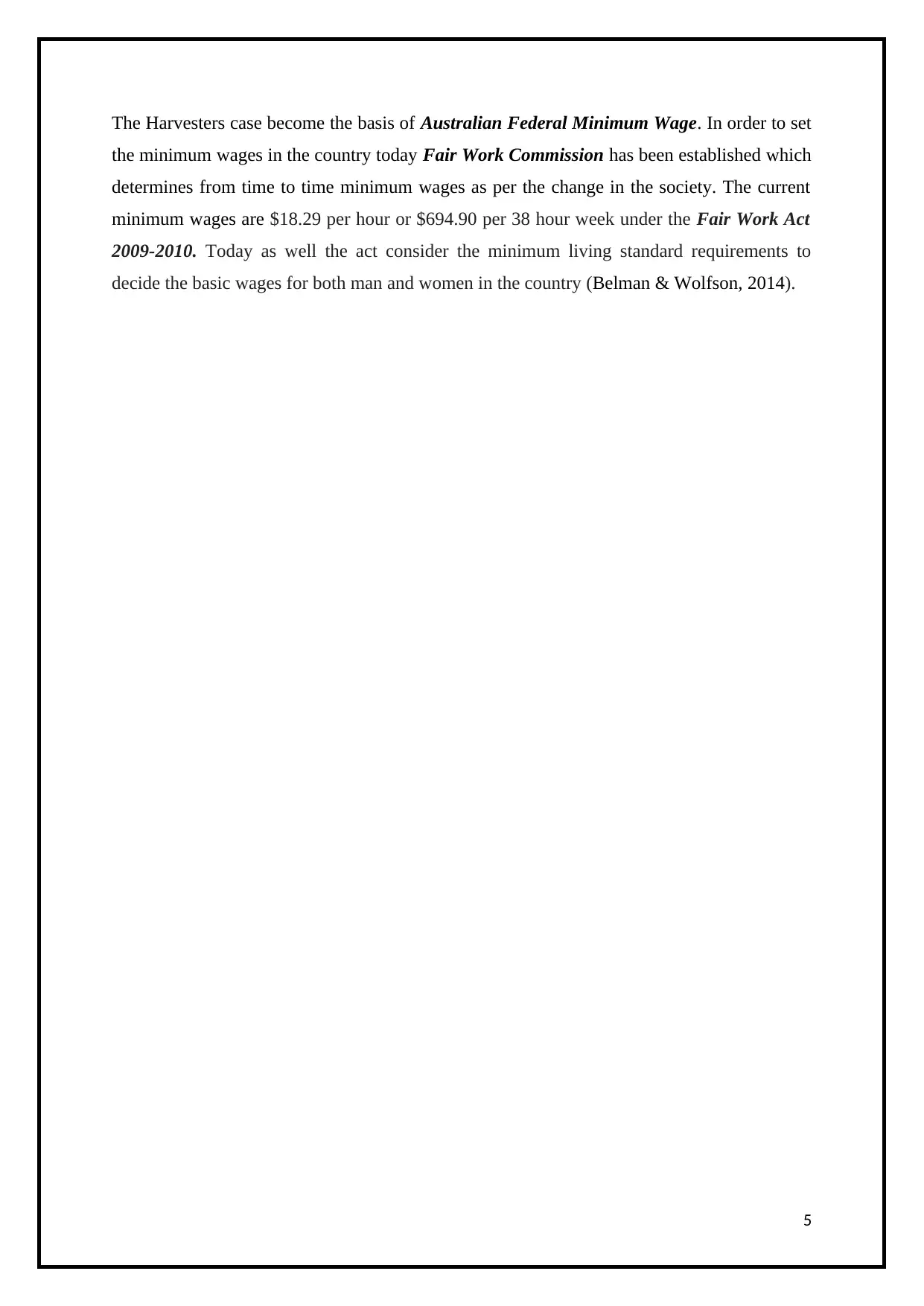
The Harvesters case become the basis of Australian Federal Minimum Wage. In order to set
the minimum wages in the country today Fair Work Commission has been established which
determines from time to time minimum wages as per the change in the society. The current
minimum wages are $18.29 per hour or $694.90 per 38 hour week under the Fair Work Act
2009-2010. Today as well the act consider the minimum living standard requirements to
decide the basic wages for both man and women in the country (Belman & Wolfson, 2014).
5
the minimum wages in the country today Fair Work Commission has been established which
determines from time to time minimum wages as per the change in the society. The current
minimum wages are $18.29 per hour or $694.90 per 38 hour week under the Fair Work Act
2009-2010. Today as well the act consider the minimum living standard requirements to
decide the basic wages for both man and women in the country (Belman & Wolfson, 2014).
5
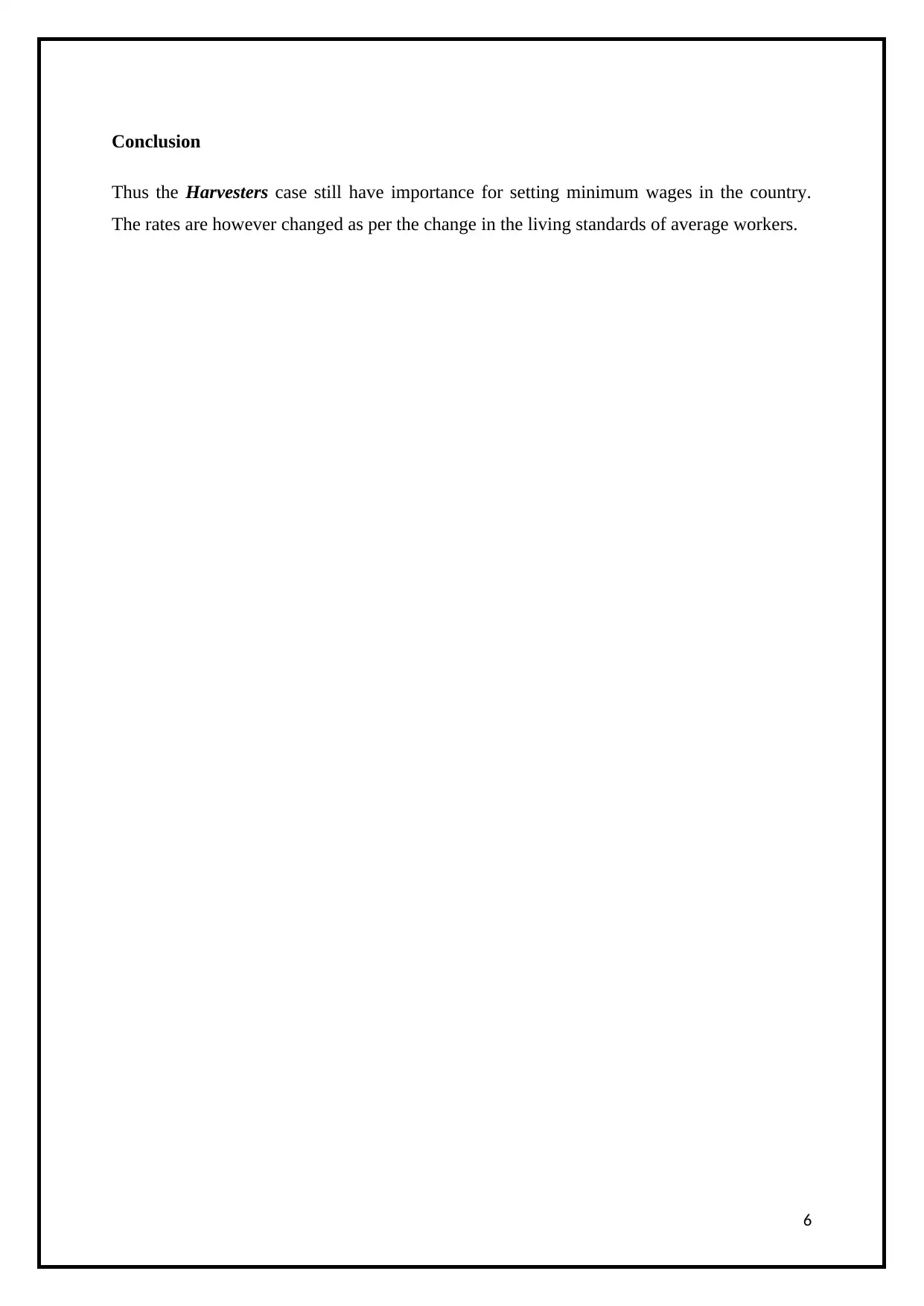
Conclusion
Thus the Harvesters case still have importance for setting minimum wages in the country.
The rates are however changed as per the change in the living standards of average workers.
6
Thus the Harvesters case still have importance for setting minimum wages in the country.
The rates are however changed as per the change in the living standards of average workers.
6
⊘ This is a preview!⊘
Do you want full access?
Subscribe today to unlock all pages.

Trusted by 1+ million students worldwide
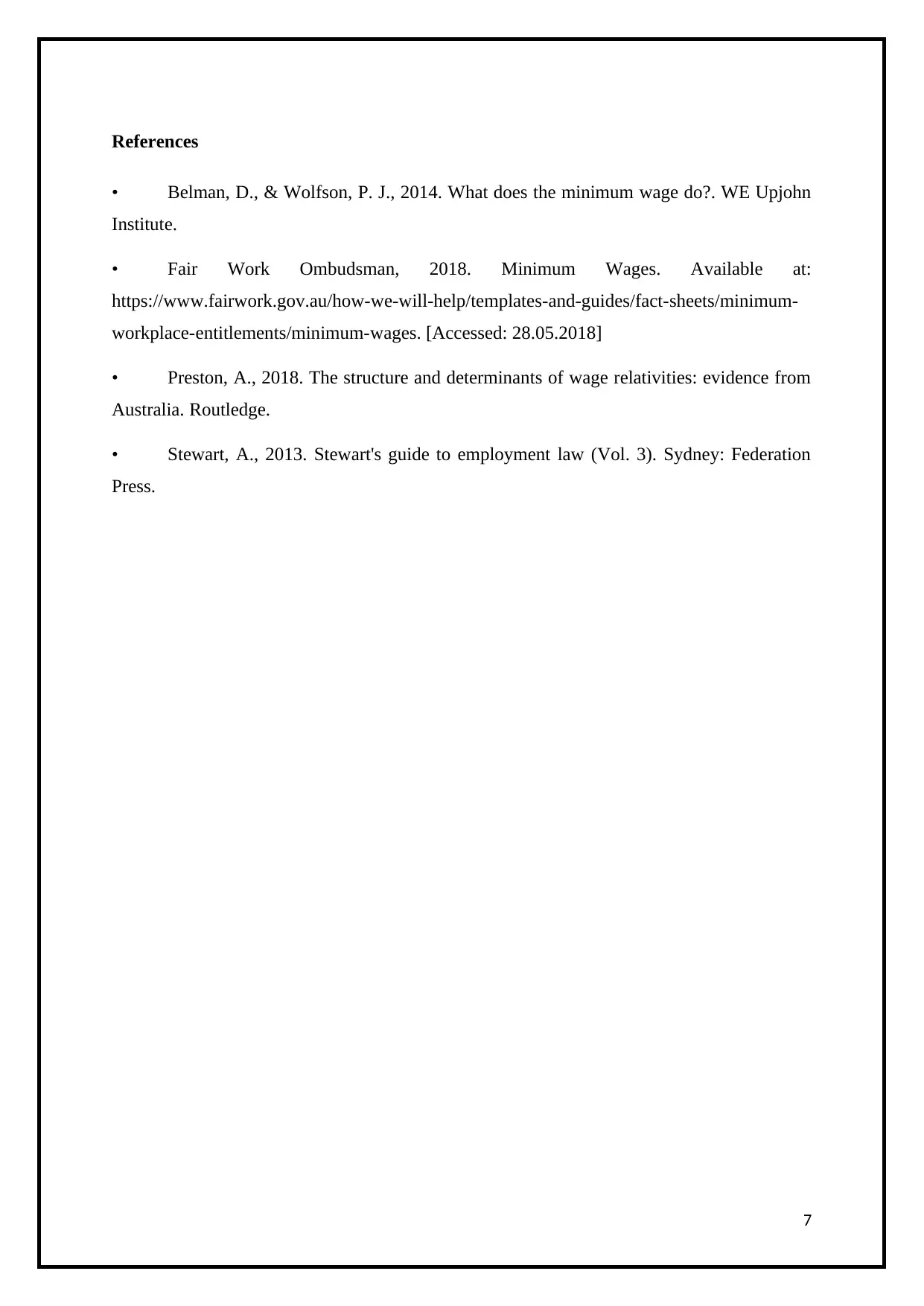
References
• Belman, D., & Wolfson, P. J., 2014. What does the minimum wage do?. WE Upjohn
Institute.
• Fair Work Ombudsman, 2018. Minimum Wages. Available at:
https://www.fairwork.gov.au/how-we-will-help/templates-and-guides/fact-sheets/minimum-
workplace-entitlements/minimum-wages. [Accessed: 28.05.2018]
• Preston, A., 2018. The structure and determinants of wage relativities: evidence from
Australia. Routledge.
• Stewart, A., 2013. Stewart's guide to employment law (Vol. 3). Sydney: Federation
Press.
7
• Belman, D., & Wolfson, P. J., 2014. What does the minimum wage do?. WE Upjohn
Institute.
• Fair Work Ombudsman, 2018. Minimum Wages. Available at:
https://www.fairwork.gov.au/how-we-will-help/templates-and-guides/fact-sheets/minimum-
workplace-entitlements/minimum-wages. [Accessed: 28.05.2018]
• Preston, A., 2018. The structure and determinants of wage relativities: evidence from
Australia. Routledge.
• Stewart, A., 2013. Stewart's guide to employment law (Vol. 3). Sydney: Federation
Press.
7
1 out of 7
Related Documents
Your All-in-One AI-Powered Toolkit for Academic Success.
+13062052269
info@desklib.com
Available 24*7 on WhatsApp / Email
![[object Object]](/_next/static/media/star-bottom.7253800d.svg)
Unlock your academic potential
Copyright © 2020–2026 A2Z Services. All Rights Reserved. Developed and managed by ZUCOL.





